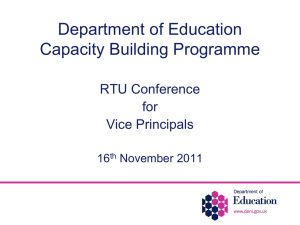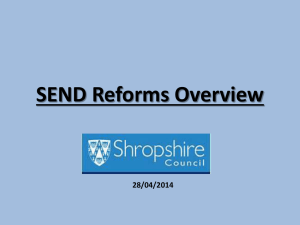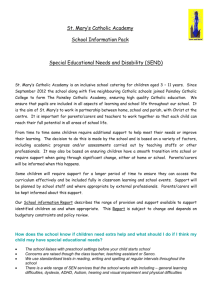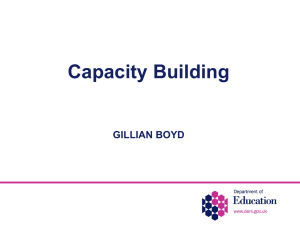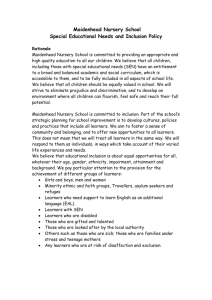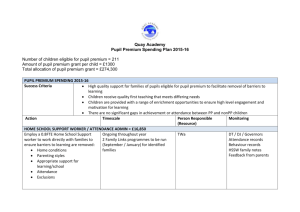Special Educational Needs: Local Offer (Draft)
advertisement
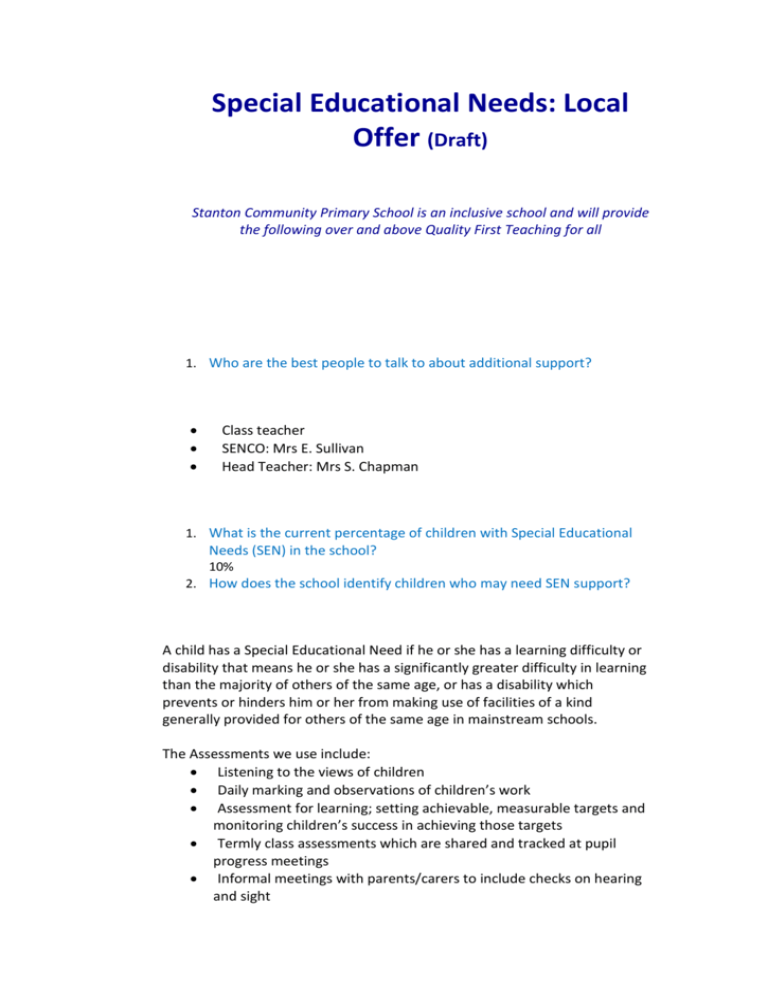
Special Educational Needs: Local Offer (Draft) Stanton Community Primary School is an inclusive school and will provide the following over and above Quality First Teaching for all 1. Who are the best people to talk to about additional support? Class teacher SENCO: Mrs E. Sullivan Head Teacher: Mrs S. Chapman 1. What is the current percentage of children with Special Educational Needs (SEN) in the school? 10% 2. How does the school identify children who may need SEN support? A child has a Special Educational Need if he or she has a learning difficulty or disability that means he or she has a significantly greater difficulty in learning than the majority of others of the same age, or has a disability which prevents or hinders him or her from making use of facilities of a kind generally provided for others of the same age in mainstream schools. The Assessments we use include: Listening to the views of children Daily marking and observations of children’s work Assessment for learning; setting achievable, measurable targets and monitoring children’s success in achieving those targets Termly class assessments which are shared and tracked at pupil progress meetings Informal meetings with parents/carers to include checks on hearing and sight Discussion with and observations by Literacy/Numeracy leaders/SENCo Consideration of readiness to learn Consideration of any difficulties with memory, motor skills and vocabulary. PhAB (Phonological Assessment Battery) BPVS (The British Picture Vocabulary Scale) Sandwell Early Numeracy Test Information sharing (teachers, support services, parents/carers, pupil involvement) Developmental history with parents including Speech and Language issues Consultation with the Advisory Support Teacher Referral and consultation with Education Psychologist Referral to the school nursing team Child and Family Consultation Service Speech and Language Therapists 1. What are the different types of support available? We assess each child individually and provide personalised support within three levels: Universal: Quality First Teaching (see our Teaching for Learning Policy and SEND Policy). We start from what the children already know and set small targets or learning objectives. We plan and teach differentiated activities and provide small group support to enable children to achieve these targets. We provide plenty of opportunities for practice. We monitor progress. We ensure that parents are aware of the nature of the support and the reason for it. We listen to the views of parents and pupils and involve them in the decision making. We hold weekly open mornings and regular parents evenings We have pupil progress meetings with the class teacher and senior leadership team and the SENCo We consider children’s self- assessment We plan support from specialist teaching assistants and the class teachers We write end of year reports Targeted: We determine children’s areas of strength to establish whether the child has difficulties across the curriculum We collate data - assessment levels, phonics and spelling assessments We assess skills such as reading accuracy, fluency, and comprehension, phonological awareness, auditory and visual memory We consider - underlying ability, behaviour, motor skills, medical needs and attendance We create a personal provision map Children may access some of the following small-group interventions to achieve their targets: Listening skills activities for Literacy and Maths Speaking and Listening activities based on ELKLAN teaching methods Acceleread/Accelerwrite Fischer Family Trust literacy support Pre-teaching of vocabulary ELS (Early Literacy Support) ALS (Advanced Literacy support) Quest (Year 3 literacy programme) Turn Around Reading Bear Necessities Auditory Discrimination Tasks Memory and concentration task Gym Trail 1st Class at Number Numicon Talking games Time to Talk Nurture group / time out space Socially Speaking Lego Therapy Precision Teaching Specialist: This means your child will have been identified by the class teacher/ SENCO as needing a particularly high level of support or small group teaching, which often cannot be provided from the budget available to the school. This is usually provided via an Education, Health and Care Plan (EHCP). This is a legal process which sets out the amount of support that will be provided for your child. Usually your child will also need support from professional outside the school. This may be from: Local Authority central services such as the ASD Outreach Team Sensory Service (for students with a hearing or visual need). Educational psychologists For your child this could mean: Creating a personal provision map, to set individual targets, to outline strategies of how we aim to achieve them and to monitor the impact. Annual review 1:1 interventions Personalised curriculum Exercise programmes Speech and Language programmes to support Speech Therapists 1. How is extra support allocated to children? Support is allocated on a needs basis and depending on children’s progress which is discussed at termly pupil progress meetings. Resources including staff are reviewed and deployed as appropriate. The SEN budget is used to deploy staff and buy appropriate resources. Suffolk County assessments are completed, evidence of children’s needs collected and additional ‘High Tariff Funding’ is applied for following Suffolk County Council criteria. 1. How will we measure the progress and review provision for your child? School assessment in including Literacy and Numeracy and Personal and Social education Reading/ Spelling tests Progress against their individual targets including P scales from the end of year 1 and use of EYFS goals in year 1 Reviews of interventions Annual Review We always involve children/ parents in the monitoring and review process. 1. How can I tell the school I am concerned about my child’s progress or wellbeing? Your first step should be to speak to your child's class teacher. If you feel that additional support is needed beyond the universal level of provision, please speak to: The Special Educational Needs Coordinator (Mrs E. Sullivan) Headteacher ( Mrs S.Chapman) Tel: 01359 250225 or email ad.stanton.p@talk21.com 1. How will the school work with me as a parent in discussions about my child and their learning? We would: Invite parents in to discuss their child and any concerns Discuss next steps in school and at home Make any referrals to outside agencies as necessary Implement any steps required at school and offer ideas for support at home Review progress termly and discuss next steps 1. How do we involve young people with SEN in discussions about their education and support? Through Building Learning Power we encourage the children to talk about their learning and how to make it better. We encourage the children to challenge themselves against their own personal targets and celebrate all achievement. We have ‘children friendly’ personal provision maps that are created and reviewed with children. 1. How are adults in school helped to work with children with SEN and what training do they have? All teachers are trained to provide Quality First Teaching and differentiate appropriately for all the children in their class. Teachers regularly attend training in supporting children with special educational needs through externally and internally run courses. Strategies are shared at staff meetings and other training days. Our Nationally Accredited SENCo offers advice on Quality First Teaching and differentiation. The SENCo attends termly network meetings with other SENCos. We have specifically trained teachers/ TAs to implement the following: An ELKLAN approach to enhancement of language skills First Class at Number Turn Around Reading Precision Teaching Numicon Fischer Family Trust Bear Necessities 1. How will the teaching and curriculum be adapted for my child with SEN? Differentiated work Teaching assistant support ICT programs and software including Clicker, PhotoStory 3 and Communicate2Print software Visual timetables and visual prompts; Now, Next, Later schedules Workstations Nurture room access Personalised play based learning where appropriate Resources; support aids, headphones Specialised reading books Coloured over lays Work copied onto coloured paper 1. Who are the other people providing services to children with SEN? Speech and Language Therapists Local Advisory Teacher Educational Psychologist School Improvement Service Child and Family Support Service Behaviour support service Paediatricans Child and Adolescent Mental Health Services School Nursing service/GP County Inclusive Resource (ASD support in school) Occupational and Physiotherapists Neuromuscular team 1. How is Stanton school accessible to children with SEN? Physical The main school entrance has a wheel chair accessible ramp and automatic doors The back door has a wheel chair accessible slope There is a fully equipped disabled toilet and shower Visual All classes have Interactive Whiteboards, laptops and access to ipads to enable resources to be visual. Visual prompts and visual timetables are available for all children or they are personalised Auditory Seating arrangements are considered. Headphones are available Kinaesthetic Tactile resources are readily accessible Outdoor learning space 1. How will we support your child when they leave our school or move into another class? Transition: Children are prepared for their new classes / schools using discussion times such a Circle times; they meet new teachers; personalised books are made which include photos of significant adults, resources and equipment which are discussed in school and sent home as a talking point; visits to new classes / schools are made over time; internally a whole transition week is organised at the end of the school year; home visits are made by teachers if necessary; events are organised between schools and visits away from school are shared with other schools. One-page profile 1. Where else can I find support information as a parent of a child with SEN? You can read our school polices on relevant issues by visiting our website at www.stantonprimarysch.co.uk Anti-bullying policy Behaviour policy Complaints procedure Medicine policy SEN policy Or find out more information from other sources e.g. Local authority local offer at www.accessunlimited.co.uk/education/special-education-needs Parent partnership www.access-unlimited.co.uk/education/parentpartnership SEN code of practice https://www.education.gov.uk/consultations/downloadableDocs/SEN% 20Code%20of%20Practice1


